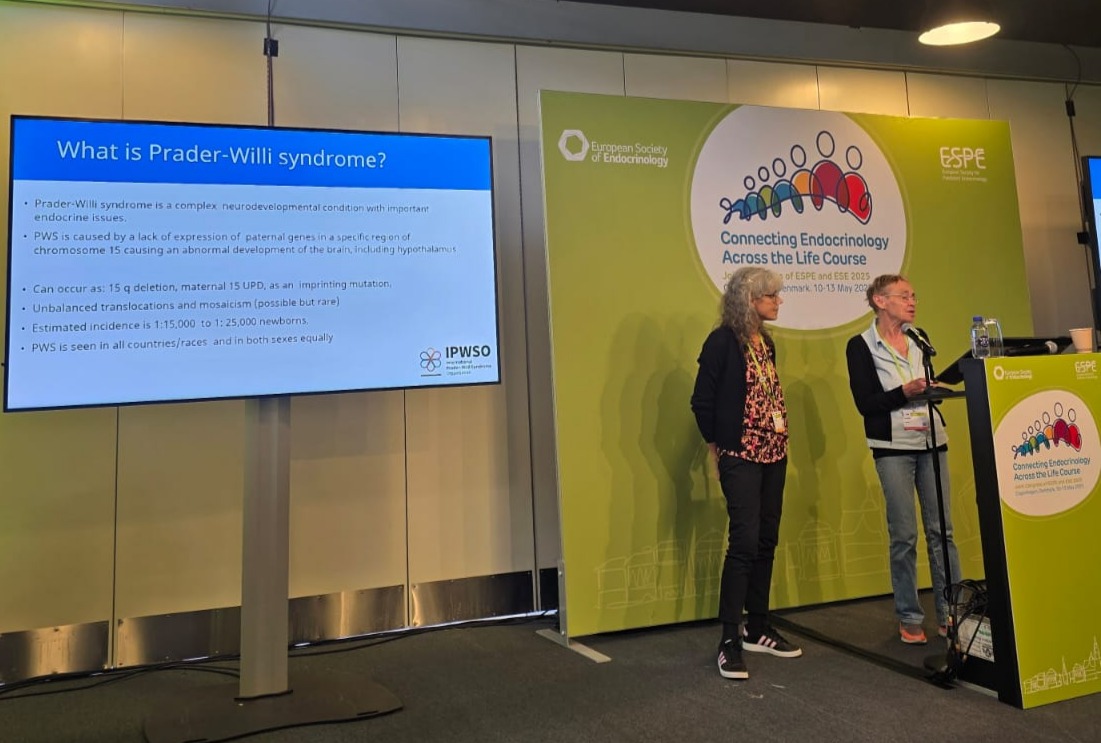A guide to rituals and obsessions
Many people with Prader-Willi syndrome (PWS) engage in repetitive behaviours and rituals. Sometimes these behaviours can be beneficial and are often used by parents and carers to implement a predictable routine. For example, having set times and routines involving exercise and meals is often the cornerstone of a healthy lifestyle for an adult living with PWS. A predictable routine can also help to alleviate anxiety. A routine reduces idol time and the possibility of unscheduled opportunities for additional food.
However, not all rituals are beneficial and over time some people with PWS can become so set in following a routine that this can lead to problems, for example hoarding or refusing to do anything until they have completed a particular routine. In addition, if the rituals involve other people it can create further problems and even develop into an unhealthy or unwelcome obsession with another person.
Some examples of problematic rituals and obsessions include:
- Asking repetitive questions or repeating the same statement over and over
- Hoarding
- Ordering and arranging objects
- Refusing to throw out old clothes
- Collecting cheap items such as newspapers, pamphlets, pens, magazines or hairclips to the point where their bedroom is cluttered
- Squeezing a shampoo or shower gel bottle too many times, so using “too much”
- Excessive use of tissues, toilet paper, sanitary pads
- Wanting to wear the same set of clothes each day
- Becoming obsessed with a favourite hobby e.g. playing video games
- Insisting on only doing particular jobs at work and refusing to do other work
- Refusing to be served at a store by anyone other than a particular person
- Refusing to go out with anyone other than a favourite worker, in the case of paid support
- Becoming obsessed with a friend at work and insisting on sitting next to them all of the time
- Phoning others at set times or repeatedly asking about them to the point where they are fixated on them
- Becoming obsessed with what someone is doing
- Making unrealistic demands on a friend e.g. expecting them to stay with them all of the time at a party or gathering
The last 6 points can be very difficult to manage as they involve other people and may cause much stress for those people. They may require serious management to prevent very complicated situations for all.
A parent writes
It was very difficult for my daughter to let some of her toys and magazines go. Fortunately, she is very aware of the poor and others less fortunate than her. I used this as a reason for her to part with her collectables and so she was finally prepared to pass them on to other children in need of toys and magazines.
Why do people with PWS engage in Rituals?
Research has shown that many people with PWS engage in greater levels of repetitive and ritualistic behaviours than the general population. This drive to seek and collect items is thought to be genetically related to the drive to seek and consume food. It is a well-known trait of PWS and can be challenging for the family and others. It can be stressful for the person with PWS by disturbing their attention and engagement in activities, even those they enjoy. Rarely can the person with PWS explain why he/she practices these behaviours or rituals. People with PWS often have fixed beliefs and can be very resistant to change, so challenging routines and rituals can result in severe and violent reactions.
The behaviour seen has been likened to the ritualist behaviour seen in people on the autistic spectrum. In some cases routines and rituals may help to reduce anxiety. They can also be enjoyable for a person with PWS, therefore separating this behaviour from Obsessive Compulsive Disorder. In addition, routines and rituals can give a sense of structure, security, control and predictability to the person with PWS.
What can you do when rituals and obsessions appear to be getting out of hand?
Here are simple and practical strategies that can help minimise the negative impact of rituals or obsessions.
- Encouraging acceptance of change is important. Whenever discussing plans or routines it is useful to remind the person with PWS that things could change e.g. reminding them that ‘life is an adventure and we are never sure what will happen. There could be changes but we will make the most of them.’ However, for some people who have such fixed ideas or feelings for situations, change will still be almost impossible, despite the reasoning.
- Agreements can be useful, for example, if hoarding items is an issue, allocate a specific box or cupboard to store those items. Make an agreement that once the box or cupboard is full some items will need to be thrown out or better still, donated for a charitable or worthwhile use, before a new item is put into the space. Part of an agreement to buy a new magazine could be discarding old one first. Visualising an agreement helps people with PWS understand a plan, more easily.
- Mix it up! Sometimes it is good to have some changes in rituals which are planned and discussed in advance. This can help to build skills in accepting changes. Compliment the person with PWS on their “maturity” in being able to make or accept change. Flexibility cards are useful visual tools that can be used when a change is about to happen.
- Encouraging and negotiating small changes to set routines or rituals from time to time can be very helpful. For example, if somebody insists on using the same cutlery, cups, plates and placemat every breakfast and putting them in same position each day, you could negotiate a change to just one item and then build to more changes over time. Using a person they really like as an example of someone who is doing/using the same, can be helpful.
- Using visuals to set out a routine. These can be helpful to limit the time that is spent on a hobby or ritual that is becoming an obsession e.g. limiting the amount of time spent playing video games; set a timer with a visual display of passing time for bathroom use and other activities that need to be limited.
- Setting clear boundaries and rules around relationships can help with obsessions about others, for example, explaining that you can’t call people after a certain time at night or that you can only call them a certain number of times per week.
If there is an obsession about another person, it is useful to find out if there is any relationship with food, for example, does the person who serves them coffee also give them a free biscuit? If this is case you may be able to stop them from doing this by explaining the problems it causes.
Obsessions with people can develop if they do not set boundaries when they first meet someone with PWS. Therefore it is important to educate any new friend and encourage them to not allow the person with PWS to manipulate them into giving them food, money or other items. It might also be best not to give the person with PWS their phone number. Likewise, it is important for them to point out to the person with PWS, if they feel that they are being inappropriate in their requests or conversations.
- Working with the rituals and routines to encourage positive behaviours. For example, if someone is obsessed with getting a magazine, consider walking with them to the shops each week to get it rather than driving.
- Sometimes a new ritual can be related to food but you may not realise it at the time e.g. if every day a person with PWS starts to leave work early and is adamant that they must leave by a set time it may be that they have found some unsupervised food or money that they can access at that time. Therefore it always important to investigate any possible links with food.
- Discussing personal space and also the types of conversations and behaviours that are appropriate with other people. Role playing both acceptable and unacceptable behaviour, with the person with PWS is a good visual way to demonstrate what you mean.
- If a new ritual or routine is developing, and you are concerned that it will cause problems in the future, it is better to change it before it becomes too entrenched.
A parent relates: every Saturday two friends, one with PWS, shared a lift to a soccer game as they were both on the same team. The person with PWS wanted to leave for the game increasingly early and eventually it put pressure on the friendship, because the other person did not want to arrive ridiculously early to the games and preferred to sleep in. After a number of weeks, a later time was set to leave for the games. However, in retrospect, it would have been better and easier to have acted sooner before things got out of hand.
- It can be helpful to monitor, supervise and limit internet use, as unhealthy relationships can readily form online. People with PWS are often vulnerable. In addition they may not understand what is considered acceptable and appropriate behaviour when they are online.
Changing ritualistic or repetitive behaviour is not always easy, and may take time. Praise any positive change in the behaviour but try to ignore or divert from arguing and resistance to change. Be patient and consistent when you suggest a strategy or idea to initiate change. Sometimes, offering an appropriate reward for acceptance of change can direct attention from the change.
When an Obsession is Linked to Psychosis
Psychosis is a mental disorder that impacts a person’s perception or understanding of reality. It can include hearing voices, hallucinations or irrational beliefs, all of which can be frightening and seem very real. People with PWS are known to have a higher incidence of psychosis. Obsessions can also be linked to psychosis, so it is important to monitor obsessions that appear to be irrational. Psychosis in people with PWS can be linked with an increase or change in repetitive and ritualistic behaviours. If you are concerned that an obsession is becoming increasingly irrational or if you believe that there is the possibility that your person with PWS is suffering from mental illness, it always best to seek medical advice. Similarly, if there is a marked reduction in a previous obsession for no obvious reason, watch for signs of low mood or depression. A medical assessment will be required to diagnose and treat a mental illness, such as depression or psychosis
Managing repetitive behaviour and rituals in people with PWS will create change for them. Remember, change can be very stressful for people with PWS as it threatens their sense of security and can increase their anxiety. With gentle, positive talk and replacing what is removed or changed with something desirable or understandable will help the person with PWS accept that change does occur and may be needed.
This article was written by IPWSO’s Famcare Board.
International Community
IPWSO was established so that PWS associations, families, clinicians and caregivers around the world could exchange information and support and have a united global voice under one umbrella.
Information for Medical Professionals
The latest medical and scientific research and information, plus guides into common medical issues affecting people with PWS.
Paediatric Association of Nigeria - 57th Annual Scientific Conference
IPWSO was proud to support a dedicated PWS symposium at the 57th Annual Scientific Conference of the Paediatric Association of Nigeria (PAN) Conference held 21-23 January 2026 in Ogun State.
Famcare Board Member, Dr Elizabeth Oyenusi, presented on the clinical features, diagnosis, and management of PWS, while Dr Oluwakemi Ashubu shared the first genetically confirmed case of PWS in the country - an important milestone. The session attracted over 104 delegates and sparked a lively discussion.
IPWSO also hosted an exhbition table throughout the 3-day conference, distributing educational materials and engaging directly with healthcare professionals.
We are hugely grateful to Dr Oyenusi, Dr Ashubu and Dr Oladipo (Senior Registrar) for their support in making this educational oureach possible - helping to strengthen awareness and improve early diagnosis of PWS in Nigeria. Funding for this event was kindly provided by Friends of IPWSO (USA).
Global Newborn Society Inaugural Conference, Sweden
The Global Newborn Society’s 1st Conference took place in Uppsala and Stockholm, Sweden, from 2-4 November 2025, marking an exciting milestone for the organisation’s international community.
We were delighted that Dr Susanne Blichfeldt was invited to deliver a plenary lecture on behalf of IPWSO, titled “Neonatal Hypotonia: Clinical Features Seen in PWS That Can Help Differentiate It from Other Congenital Disorders with Similar Symptoms.”
The inaugural event brought together a diverse audience of physicians, nurses, and social care leaders from around the world. The programme was wide-ranging and stimulating, featuring cutting-edge discussions on newborn health, early diagnosis, and innovative care practices - setting a strong foundation for future collaboration within this growing global network.
ASPED 2025, Dubai, UAE
The 6th conference of the Arab Society for Paediatric Endocrinology and Diabetes was held in Dubai over two days on the 26th and 27th September 2025. IPWSO was invited to be a partner and to present at a session on PWS. The conference was attended by over 400 paediatric endocrinologists from more than 20 countries in the Middle East and North Africa. Charlotte Hoybye and Tony Holland attended and presented on behalf of IPWSO and Dr Sarah Ehtisham described her experience seeing patients with PWS in the United Arab Emirates. IPWSO hosted a stand for the whole conference.
In conversation many attendees reported seeing people with PWS and described the challenges they faced, particularly with the management of behaviour problems. Some felt nervous about starting growth hormone as they had had no experience prescribing it to infants with PWS.
Approximately 100 attendees joined the IPWSO mailing list and attendees were very keen to gain knowledge about PWS. Numerous memory sticks with information on PWS and printed material in English and Arabic were taken. Some attendees talked about establishing national or regional PWS Associations.
This was an extremely positive experience and hopefully attending this meeting has laid the groundwork for IPWSO to engage more fully in the Region in the future. We were very well looked after, and the organisers were excellent hosts.
EPNS 2025, Munich, Germany
Together with parents and representatives from the Prader-Willi-Syndrom Vereinigung Deutschland, we were proud to host a PWS exhibition stand at the 16th Congress of the European Paediatric Neurology Society, held in Munich from 8-14 July 2025. The event welcomed over 2,000 medical professionals from around the world.
We had the pleasure of engaging with attendees from Türkiye, Iraq, Palestine, Croatia, Moldova, the Philippines, Ukraine, North Macedonia, Kazakhstan, Armenia, and many local specialists.
Dr. Stefani Didt, Gesellschafter at Katholische Jugendfürsorge der Diözese Augsburg, kindly supported us at the stand and provided expert responses to clinical enquiries. We hope these international connections will contribute to raising awareness about IPWSO’s work, particularly in improving access to genetic testing in underserved regions.
We also highlighted the new treatment for hyperphagia and shared our recent publication, "Improving Mental Health and Well-being for People with PWS."
Sincere thanks to our colleagues from PWS Vereinigung Deutschland and to Dr. Didt for their invaluable support.
ESPE-ESE 2025, Copenhagen, Denmark
IPWSO was honoured to participate in the recent Joint Congress of the European Society for Paediatric Endocrinology (ESPE) and the European Society of Endocrinology (ESE), held in Copenhagen from 10–13 May 2025. This important event provided an invaluable opportunity to raise awareness of Prader-Willi syndrome (PWS) among a broad international medical audience.
IPWSO was represented by our CEO, Margaret Walker, along with Dr Charlotte Höybye from Sweden and Dr. Susanne Blichfeldt from Denmark—both esteemed members of IPWSO’s Clinical and Scientific Advisory Board.
Dr Blichfeldt noted that this congress is a major event in the clinical academic calendar and has a particular significance as it marks the first-ever joint meeting of these two prominent societies. Despite its European designation, the congress attracted participants from around the globe, including delegates from the Middle East, Africa, the United States, Japan, Australia, and New Zealand.
IPWSO’s educational booth was strategically positioned within the Patient Advisory Group area dedicated to rare disease organisations. As part of the programme, we were invited to deliver a 30-minute presentation during the Patient Voices Session. Dr Charlotte Höybye and Dr Susanne Blichfeldt presented on Prader-Willi syndrome (PWS), with a focus on genetics, endocrinology, and clinical manifestations. Our presentation, along with many others, was recorded and is now available on demand via the ESPE-ESE congress platform.
PWS was prominently featured throughout the congress. In a session on the transition of care for patients with rare diseases, Dr. Maithé Tauber (Toulouse, France) discussed the specific challenges associated with the transition period in PWS. She emphasized the need for multidisciplinary care and ongoing specialist follow-up in adulthood through dedicated PWS clinics.
Another session addressed medical and clinical management in both children and adults with PWS, again highlighting the critical importance of a smooth transition from paediatric to adult care and the role of specialised clinics. The session included an in-depth discussion on hyperphagia in PWS, exploring its profound impact on individuals and their families. Management strategies were reviewed, and a new medication, Vykat, was presented as a potential treatment for hyperphagia.
In addition, there was a strong presence of scientific posters on PWS from various countries, covering a wide range of topics such as hormonal therapies, genetic findings, ageing, and guidance for families. A total of 33 posters focused on PWS, reflecting a growing global interest and commitment to advancing knowledge and care in this area.
We were greatly encouraged by the high level of engagement and the visibility given to PWS throughout the congress. This increased awareness brings hope that more children will be diagnosed earlier and receive appropriate, specialised medical care from childhood through to adulthood.
ASPAE 2025, Abidjan, Côte d’Ivoire
After Yaounde (Cameroon 2023) and Alger (Algeria 2024), IPWSO was pleased to be present at the 16th Annual Congress of the African Society of Paediatric and Adolescent Endocrinology (ASPAE), at the invitation of Dr Kouamé Hervé Miconda, Programme Co-organiser. Prior to the main conference, IPWSO, in partnership with Dr Micondo, organised a dedicated PWS workshop which attracted 60 professionals - paediatricians, endocrinologists, doctors, students, nurses, and midwives.
MENA 2025 Abu Dhabi, UAE
The Middle East and North African (MENA) conference for Rare Diseases was held in Abu Dhabi, United Arab Emirates, between 17th and 20th April 2025. Tony Holland represented IPWSO at this meeting and presented a poster about our work. The conference was attended by clinicians, genetic councillors, scientists, and other health disciplines from across North Africa and the Middle East. The conference was in English as many clinicians in this part of the world are from elsewhere and not Arabic speakers. The conference was of a very high standard and ranged broadly across many rare genetically determined conditions as well as there also being discussions about how to develop services and how to seek approval for new treatments. Our poster was one of five that was selected as the best posters exhibited at the meeting. Tony said, "My experience of the conference was very positive and I am sure there are opportunities that can be built on. Being part of the endocrinology meeting, which is likely to be attended by endocrinologists from across the whole region, provides a wonderful opportunity to engage more fully with clinicians most likely to see people with PWS".
Kenya Paediatric Association Annual Scientific Conference, Monbassa, Kenya
Dr Menbere Kahssay and Dr Renson Mukhwana, Aga Khan University Hospital, Nairobi represented the Kenyan team and, together with Drs Constanze Laemmer and Dr Charlotte Höybye, managed the IPWSO educational booth at our first meeting in this region.
A dedicated session on PWS significantly raised awareness and knowledge about the syndrome among paediatricians and allied health professionals.
Dr Kahssay said, "We were able to have track and plenary session and four days interaction with the participants at the booth.
The PWS session focused on case experiences and regional differences in PWS management. Thanks to IPWSO’s support, Drs Charlotte Hoybye and Constanze Lammer joined as expert speakers, sharing their valuable experiences in managing PWS across the neonatal, childhood, and adult stages".
Dr Menbere Kahssay and Dr Renson Mukhwana presented genetically confirmed local cases, highlighting diagnostic challenges and treatment approaches.
Third Biennial Rare Diseases Conference, Rare X, Johannesburg, South Africa
Karin Clarke and Molelekeng Sethuntsa organised the IPWSO exhibition table at this event in Johannesburg from 14-17 February 2024. Molelekeng attended the conference and reported on the excellent discussions that focused on the challenges of early diagnosis, especially in Africa, centres of excellence, and ways that the Department of Health, WHO and RDI can improve detection and treatment of rare diseases.
6th RARE Summit 2023, Cambridge, UK
Tony Holland, President, and Agnes Hoctor, Communications and Membership Manager, represented IPWSO at the 6th RARE Summit organised by Cambridge Rare Disease Network on 12 October, 2023.
MetaECHO® 2023, Global Conference, Albuquerque, New Mexico
The 5th MetaECHO® Global Conference took place from September 18-21 in Albuquerque, New Mexico. It celebrated 20 years of ECHO programmes and brought together ECHO leaders, partner teams, government officials, funders, policy makers, and industry experts to share retrospective work and thoughts on the future of ECHO. Our President, Tony Holland, presented a paper on “A Global ECHO Programme for the Rare Disorder – PWS", based on IPWSO’s Project ECHO programme.
EPNS 2023, Prague, Czech Republic
The 15th European Paediatric Neurology Society Congress (EPNS) took place from 20-24 June. Tünde Liplin, PWS Hungary, and Hana Verichová, PWS Czechia, represented IPWSO. Twenty-two people from countries including Georgia, Israel, Lithuania, Turkey, Italy, Slovakia, Romania, Netherlands, Bosnia Herzegovina, Belgium, Argentina, Norway, Serbia, India, and Australia subscribed to the "Stay in touch with IPWSO!" contact list. Tünde reported that many people came to the stand just to inquire and chat, the majority of whom were hearing about IPWSO and our work for the first time.
ECE 2023, Istanbul, Turkey
The European Congress of Endocrinology (ECE) took place from 13-16 May. We hosted an information table and were represented by IPWSO advisers, Constanze Lämmer and Charlotte Höybye, and also our Communications and Membership Manager, Agnes Hoctor. We were pleased to be given the opportunity to present on IPWSO and PWS at the Hub Session. The most exciting and important element for us was that the Turkish location meant that delegates came from many countries in Middle East as well as Europe.
ASPAE 2023, Yaoundé, Cameroon
We hosted an educational booth and presented at the round table on Obesity at this important Endocrinology conference hosted by the African Society of Paediatric and Adolescent Endocrinology (ASPAE) from 9-10 February. Read our blog about our visit.
ECE 2021, Online
We hosted an educational booth and gave a presentation at the European Congress of Endocrinology in May 2021.
ESPE 2019, Vienna, Austria
We exhibited at the European Society of Paediatric Endocrinology (ESPE) Conference in Vienna, Austria, which took place in September 2019. Find out more in our blog.
ECE 2019, Lyon, France
We exhibited at the European Congress of Endocrinology in May 2019.

Dr Ashubu discussing IPWSO's educational materials with delegates at our booth.

IPWSO was honoured to be invited to present at the Global Newborn Society's Inaugural Conference.


Dr Sarah Ehtisham presenting at ASPED 2025 followed by a panel discussion.

Colleagues from PWS Vereinigung Deutschland help manage our PWS stand at EPNS 2025. Many thanks to all the parents and carers for their invaluable support!

Dr Charlotte Höybye (Sweden) and Dr. Susanne Blichfeldt (Denmark) presenting at the ESPE-ESE Patient Voices Session - May 2025

Dr Blichfeldt and Margaret Walker (CEO) managing our IPWSO educational booth.

François Besnier, IPWSO's Vice President, meeting some of our travel fellowship delegates at ASPAE 2025.

IPWSO's poster achieves top award!

Many thanks to Drs Constanze Laemmer, Menbere Kahssay, Charlotte Höybye and Renson Mukwana for all their support at KPA 2025.



